Primary navigation
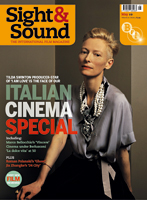
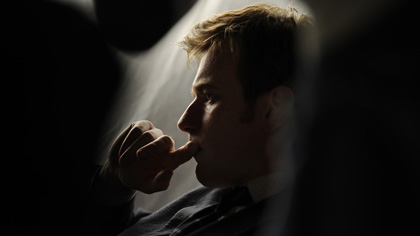
Roman Polanski’s thriller about an ex-prime minister haunted by past crimes has acquired an extra twist of intrigue in the light of the director’s own arrest. Philip Horne unravels the tangled web of The Ghost
Watching Roman Polanski’s paranoid thriller The Ghost, it’s hard to ignore certain uncanny parallels between the film’s story and the story surrounding the film itself. The 76-year-old director’s dramatic arrest last September in Switzerland, with the intention of extraditing him to the US over 30 years after he fled the country, and the accompanying international media hoo-ha both seemed to mirror situations in The Ghost. In the film, the Blair-like former British Prime Minister Adam Lang (Pierce Brosnan) frets about having to remain in exile in the US; he’s there because it’s one of the few countries (others named include North Korea and Iran) from which he can’t be extradited to Europe to stand trial for war crimes – Lang is alleged to have co-operated with the CIA in sending detainees for torture. In The Ghost too a media circus starts and a long-running charge on the back-burner blazes up to become the top story and cause célèbre.
Journalists at the Ghost preview had to sign a confidentiality agreement promising not to publish anything about it till its release; in the film, the ghostwriter hero (Ewan McGregor) has to put his name to a disclaimer in triplicate before he can see the manuscript of Lang’s draft memoirs, which he has been hired to finish and ‘sex up’ after the previous (dull) ghostwriter was found washed up on a bleak Atlantic beach. I had been due to interview Polanski for this magazine, but after his arrest that prospect was understandably swept away in the storm of legal crises and publicity (even though it had been agreed that the interview would be strictly limited to discussion of his work). And a few hours before the deadline for this piece, it was announced that Lang’s original, Tony Blair, was to publish his own memoirs, entitled The Journey, in September 2010. Perhaps a ‘ghost’ is at work on them as I write. And all that’s beside the ongoing drama of the Chilcot inquiry into the Iraq war, which has seen the real Tony Blair testify on similar issues.
Is it pure coincidence, this chiming of the film’s events with those that overtook its maker? Somehow it seems unlikely. The movie is based on the 2007 thriller The Ghost, by the English novelist and former political journalist Robert Harris, which he wrote while working with Polanski on the screenplay for a film based on his earlier novel Pompeii (that film was called off because of the actors’ strike). Harris, who has said that The Ghost was influenced by the director, showed it to him prior to publication – and Polanski liked it. Harris has put on record that the novel was directly triggered by hearing a radio interview with someone who wanted Tony Blair (Harris’ former friend) tried for war crimes, noting that he could only escape trial by going to live in the US, from where he couldn’t be extradited.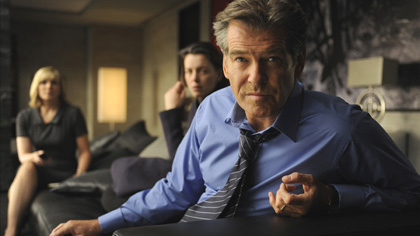
The film is set in a fenced-off hyper-modern glass-box mansion on a midwinter Martha’s Vineyard (recreated on Sylt in northern Germany, for obvious reasons); the half-reluctant ghostwriter finds himself holed up there to work round the clock on the autobiography with the stranded, restless Lang, his outspoken wife Ruth (Olivia Williams) and Lang’s devoted PA, Amelia Bly (Kim Cattrall) – plus security men. Harris’ journalistic experience obviously informed the story, getting him close to Tony Blair and giving him a sense of the intimacies of power and, as he puts it, “the way one lives in the security bubble”. But Harris’ ongoing collaboration and creative friendship with Polanski could be seen as an equally vital inspiration for the novel, partly in the richness of the biographical ironies, which Polanski (before the case blew up so extraordinarily) must have found intriguing, but also in the numerous ways the novel feels like a perfect Polanski project – and indeed has been transformed into such a seriously enjoyable Polanskian film.
Harris could be read as, in a sense, ‘ghosting’ Polanski here, creating an auteur work by digesting and recombining elements from many of his films (not that Polanski himself, judging by interviews, is much concerned with his status as an auteur). To concentrate the film so much on an interloper coming to a lonely house by the sea inhabited by an unhappy couple suggests that Harris has seen Polanski’s powerful, unfairly neglected Death and the Maiden (1994), based on Ariel Dorfman’s play (it also concerns trials for torture) and the magnificent Cul-de-Sac (1966), shot on Lindisfarne; seaside homes also figure in Macbeth (1971) and in the curious sex comedy What? (1972); one might also mention the stormy marriages so severely tested in the claustrophobic close quarters afloat in Knife in the Water (1962) and Bitter Moon (1992). The theme of stepping into a dead predecessor’s shoes – inheriting his text, his room in the beach house, his belongings – also recalls The Tenant (1976). The dead man, McAra, is a haunting presence-absence in the film; at one point Harris brilliantly has his ghostwriter follow the unwiped satnav instructions in a borrowed vehicle used by McAra to eerily retrace his final fatal tracks.
In his S&S review of the film (May 2010) Michael Brooke notes how the film revisits Frantic (1988), Polanski’s ‘Hitchcock homage’ – the macguffin here being the manuscript of Adam Lang’s memoirs, whereas there it was a souvenir miniature of the Statue of Liberty. (The manuscript remains a visual motif – “almost a character in its own right,” as Harris puts it – to the film’s end.) Harris has remarked of suspense thrillers, “I like that genre and Hitchcock was the master of it”; this taste, shared with Polanski, drives the film along with a cool, dark irony. The political conspiracy unearthed through a coded message in the manuscript recalls the discovery of the witch’s occulted identity through an anagram in a book in Rosemary’s Baby (1968) – and equally the Satanic-bibliophilic messages in The Ninth Gate (1999) found in the variants in different copies of a rare old book.
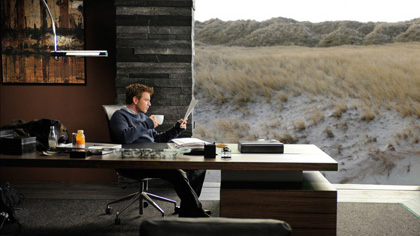
The Ninth Gate – a deliciously dry, fantastical quest-fable set in the worlds of rare books and chillingly dull witches’ covens, with Johnny Depp as an unscrupulous book hunter – already seemed a self-referentially loaded reworking of the detective plot of Chinatown (1974). The Ghost reworks Chinatown too, starting with the hiring of our hero, who is disreputable and widely despised, but successful and just sufficiently sympathetic. We may suspect, as in Chinatown, that McGregor’s ghostwriter, who has ghosted celebrity memoirs but never those of politicians, is being set up to be out of his depth – framed, in his own phrase, as “a tethered goat”. Old photographs showing crucial past associations provide clues to the mystery, cropping up here as they did in Chinatown. Moreover, there’s an Oriental (here Vietnamese) gardener at the beach house, recalling the Chinese one in Chinatown (and already there in the novel). Harris’ droll, serious, very enjoyable novel seems to be channelling Polanski while drawing on his own experiences of politics and high-stakes bestseller publishing.
Adaptation
Given this osmotic relationship, one could say that the novel is as much an adaptation of Polanski as the film is an adaptation of Harris; indeed many of the film’s identifiable ‘Polanski’ touches can be found in Harris’ book. There are things in the finished film that don’t come from the book, including the nice sequence where the ghostwriter is followed to the ferry by threatening government agents and just manages to get ashore before meeting the same fate as McAra (which we’ve seen in the opening of the film). But since Harris was the film’s co-scenarist, working closely with the director, we can hardly say for sure that such additions are purely directorial.
Harris has paid tribute to Polanski’s skill as an adapter; he reports him as saying: “The novel is the screenplay.” This suggests Polanski remains true to the approach he’s taken since adapting Ira Levin’s (terrifically sharp and tight) Rosemary’s Baby. “If you’re a film-maker and you read a good book, you want to turn it into a film,” he said in 1969. “These are very primitive desires.” As he said of that first adaptation, in his superb 1984 memoir Roman by Polanski: “I reread the book… pencilled out the irrelevant passages, and dictated a preliminary draft.”
Polanski’s self-effacing but potent aesthetic is based on close attention to the original, rather than showy changes made for the sake of stamping it with his own personality. “I don’t think that he’s interested in a particular shot or a particular dramatic piece of cinema happening for the sake of just showing off,” says Harris. “It’s always story, character and logic. One of the curious effects of working with him is to feel one is writing the novel again, but getting it right this time around. There are things in The Ghost screenplay which are better than they are in the novel. We worked at it and made it sharper.”
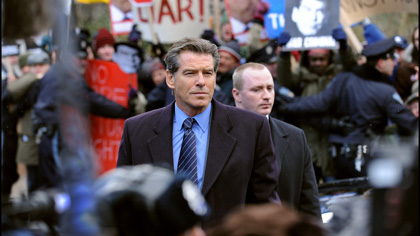
It hardly makes sense to try and assign artistic ownership of a film born of such an intimate creative partnership. But this is not to say that The Ghost lacks the characteristic notes of the Polanski terroir: the atmospheric specificity and – often – melancholy that hang over so many of his films; the poetic sense of place and light and texture, bleak and beautiful, that reflects his disillusioned, agnostic, stoical sense of life as being painfully absurd, yet illuminated by flashes of humour and beauty. With its wild grey sea and sky, the wintry island gives the whole film a sober tone that matches the bereft state of the Langs in their isolation and exile. The odd, plush house in the New England woods where a polite but faintly sinister professor (Tom Wilkinson) lives with his prissy wife has a Hitchcockian unexpectedness, an intangible air of chilly threat, for the professor is linked to Yale, Cambridge, Harvard… and the CIA, and the film’s version of Halliburton. In fact, the film takes its time and observes the tone of relations and behaviour with enough patience to convey the boredom and hollowness of power, the nasty aftertaste left in the mouth by the Faustian bargain made by the lords of this world. (It’s richer and darker in this way than Frost/Nixon).
The beautifully judged pacing – with the ironic xylophones of Alexandre Desplat’s score keeping things light and mobile – gives a thrilling sense of everything shifting uncontrollably as the media story around Lang breaks and helicopters hover overhead. In fact the whole approach – sticking so closely to the disorientated ghostwriter’s point of view – yields constant little unnerving touches of danger or disturbance (a stranger muttering something unintelligible as he passes in a hotel bar, a cellphone buzzing suddenly). And it’s typical of Polanski’s sod’s-law view of the world that when, in a crisis, the hero really needs a cab, a free one comes along but simply refuses to stop for him. From the start, when McGregor’s ghostwriter pitches for the job in a London publisher’s office (a wonderfully done meeting, with James Belushi terrific as a monstrous power broker), creeping unease lurks in the margins; as a curmudgeonly editor comments, “There’s something not quite right about this project.”
About The Ghost, on the other hand, there’s something that is quite right – particularly the performances. Polanski’s own acting experience and sympathetic method (he watches the actors go through a scene, then has the camera follow where his eye naturally goes) bring out the best from a strong cast. Ewan McGregor, even managing a cockney accent, is the right kind of cagy but cocky chancer, with a cynical line in wit that carries us with him into the Lang world; with his refrain of “Fuck!” as things go wrong, he saves the film from solemnity. Pierce Brosnan’s Lang, meanwhile, is spookily hollow, an actor caught between roles, gnawed by the self-pity of tyrants, sulking that “I’ll go where people want me!” He is not likeable here, but we can see how he might have seemed so.
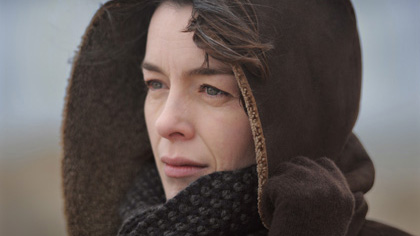
The heart of The Ghost, however, is Ruth Lang, courageously embodied by Olivia Williams as a witty, beautiful, ambitious, ragingly intelligent, frustrated, betrayed and jealous woman, the power behind her husband who is now counting the cost of the corrupt bargain she once made. She surpasses herself in a superb scene – apparently improvised by Polanski on the set – in which the camera follows a note that’s passed from hand to hand through a crowd at a party before finally being handed to her on the podium. The climax of this long take has the camera look up at her face in close-up as she reads the note – shock, anger, fear and confusion flickering across her strained features as, watched by a curious crowd of bigwigs and cronies, she is unable to express her private feelings. It’s a magnificent, moving, horrifying moment – and one that is morally charged. Polanski may be less directly engaged than Harris in the detail of British politics, but they are at one here in their vision of the small, unreal, dizzying world of those who rule us from their protective bubbles of power and wealth.
‘The Ghost’ is released on 16 April, and is reviewed in the May issue of Sight & Sound
The Ninth Gate reviewed by Philip Strick (September 2000)
The Pianist reviewed by David Thompson (February 2003)